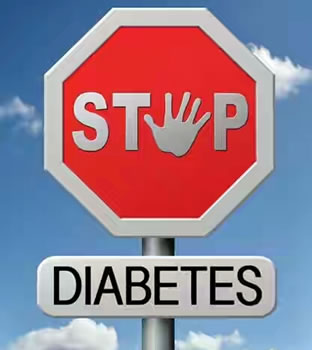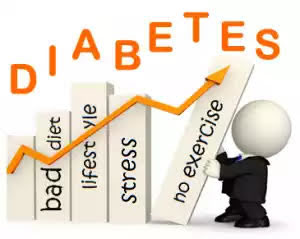Diabetes is a disease of the body sugar regulation. This disease occurs when the body has too much or too low of sugar (glucose) in the blood circulation.
Glucose is a simple sugar derived from consumed foods mainly protein, carbohydrates and fats, but the major food element the body makes glucose from is carbohydrate. Carbohydrates except fibres contain starch.
The body breaks down this starch (polysaccharide) into a smaller unit (monosaccharide) called glucose. Once the body breaks down the starch to form glucose, it is readily absorbed in the intestine into the blood.
Immediately the brain senses the presence of glucose in the blood, it stimulates an organ in the body (pancreas) to secrete a chemical called insulin.
Insulin is like a gate keeper; it opens the channels in the body cells through which glucose can pass through into them so that they would be able to utilise the glucose in the blood.
In the absence or inadequacy of this chemical, insulin, the manufactured glucose will remain in the blood and will not be able to be used by the body cells due to the closure of the gates through which they can get in that is not opened since the gatekeeper (insulin) is not available to open them.
The cells are invariably starved of glucose (energy) even though it is in the blood circulation. In cases when there is a high
The deficiency in normal absorption rate of glucose by the body determines the disease result either Diabetes Mellitus or Insipidus.
Diabetes Insipidus is a very rare case of diabetes disease – a result of high secretion of insulin.
Diabetes Mellitus is when the insulin secretion is low, leading to a reduced uptake of glucose from the blood circulation; and this is the most common type of diabetes disease affecting the populace.
There are three most common types of diabetes mellitus: Type 1, Type 2 and Gestational Diabetes. Other types of diabetes are Maturity Onset Diabetes of the Young (MODY); Neonatal Diabetes; Wolfram Diabetes; Mitochondrial Diabetes; Latent Autoimmune diabetes and Alstr m Syndrome.
Type 1 Diabetes
The more severe form of diabetes mellitus, or insulin-dependent diabetes. It’s sometimes called ‘‘juvenile diabetes’’, it usually develops in children and teenagers, though it can develop at any age.
Whilst type 1 diabetes is less common, it is still increasing by around 3% every year, particularly among children. Around 86,000 children develop type 1 diabetes each year.
Nigeria ranked 9th in the top 10 countries for the number of children with Type 1 diabetes having about 14,400 affected children.
With type 1 diabetes, the body does not secrete insulin at all. The body’s immune system attacks the pancreas to destroy the cells (Islets) secreting insulin. The reason for this is still mysterious. This attack is known as “autoimmune” disease; the reason the disease is sometimes called autoimmune diabetes.
These cells – called “islets” (pronounced EYE-lets) – are the ones that sense glucose in the blood and, in response, produce the necessary amount of insulin to normalize blood sugars.
There is currently no cure for this type of diabetes except for control measures such as supplying the body with insulin by injecting it into the bloodstream. This outside source of insulin now serves as the ”key” – bringing glucose to the body’s cells.
The challenge with this treatment is that it’s often not possible to know precisely how much insulin to take. The amount is based on many factors, including Food, Exercise, Stress, Emotions and general health.
If you take too much, then your body burns too much glucose — and your blood sugar can drop to a dangerously low level. This is a condition called hypoglycemia, which, if untreated, can be potentially life-threatening.
If you take too little insulin, your body can again be starved of the energy it needs, and your blood sugar can rise to a dangerously high level — a condition called hyperglycemia. This also increases the chance of long-term complications.
ALSO READ: Diabetes, heart disease are no longer death sentences
And, if left untreated, the high level of “blood sugar” can damage eyes, kidneys, nerves, and the heart, and can also lead to coma and death.
Factors that increase likelihood of a child having this disease include a family history of diabetes, genetics, infections and other environmental influences.
Type 2 Diabetes
Type 2 diabetes is the most common type of diabetes. It is caused by low secretion of insulin or under-utilisation of the secreted insulin in the body.
In an instance of low secretion, there will be fewer gatekeepers to open the many gates required to get glucose into the cells and when there is underutilisation of insulin, enough insulin is secreted but not all of the secreted are active. In this case, not all of them are really opening the gates for glucose to pass to the cells.
They are similitude to a non-performing employee.
Type 2 diabetes can be developed at any age even during childhood, but it is frequent in middle-aged and older people.
There has been some breakthrough in the management and treatment of this diabetes such as the use of glimepiride, acarbose, alogliptin, canagliflozin, glipizide, glimepiride, empagliflozin, dapagliflozin, colesevelam and sometimes a combination of medication. None of this medication comes with no side effect – the reason for research into the use of local herbs to cure this disease.
Nigerian scientists in the quest of finding a herbal cure for this disease has delved into a lot of vigorous researches and a lot of herbs has been identified to possess potency for lowering of the blood sugar level.
A survey of traditional healers in Ibadan, Nigeria, demonstrated that fewer than 10% of them were involved in the treatment of patients with diabetes mellitus and the total number of such patients under their care was less than 100, compared to those receiving western-type of medical treatment (up to 1000 at the University College Hospital, Ibadan, alone).
This result is no surprise has most of this native practitioners’ knowledge of the disease is infinitesimal.
An interview of 20 native practitioners revealed that they had little understanding of the nature of diabetes mellitus. Their diagnosis of diabetes was based largely on intuition and the disease was often confused with other medical problems like urinary tract infection or venereal disease, according to research.
This ignorance is prevalent among the sufferers too if not more; especially among the uneducated. Not only is the ignorance of diabetes prevalent among sufferers, affordability of its maintenance and treatment is beyond the finance of most of them.
Thanks to tireless strive of our researchers who have been on there toe to find a cure that will not only be affordable for everyone but also easily available with fewer side effects as much as possible compared to pharmaceutical treatment.
ALSO READ: Can diabetes cause eye problems?
Bridelia ferruginea, Citrus aurantium, Gongronema latifolium, Ocimum gratissimum, Rauvolfia vomitoria, Vernonia amygdalina, Carica papaya, Curcuma longa, Ipomoea batatas, Irvingia gabonensis, Gymnema sylvestre,
Phyllanthusamarus and Solanum aethiopicum. The first six involved plant samples collected from Nigeria. Only Phyllanthusamarus did not produce the desire clinical effect according to a research review conducted by Moshi et al., 2001.
WATCH TOP VIDEOS FROM NIGERIAN TRIBUNE TV
- Let’s Talk About SELF-AWARENESS
- Is Your Confidence Mistaken for Pride? Let’s talk about it
- Is Etiquette About Perfection…Or Just Not Being Rude?
- Top Psychologist Reveal 3 Signs You’re Struggling With Imposter Syndrome
- Do You Pick Up Work-Related Calls at Midnight or Never? Let’s Talk About Boundaries







